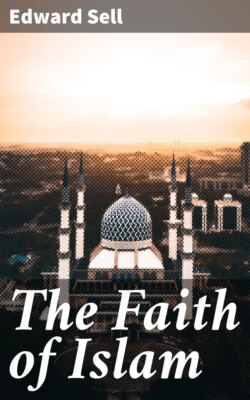Читать книгу The Faith of Islam - Edward Sell - Страница 8
На сайте Литреса книга снята с продажи.
ОглавлениеQíás, then, affords no hope of enlightened progress, removes no fetter of the past, for in it there must be no divergence in principle from a legislation imperfect in its relation to modern life and stationary in its essence.[32] In the Niháyat-ul-Murád it is written:—"We are shut up to following the four Imáms." In the Tafsír-i-Ahmadí we read:—"To follow any other than the four Imáms is unlawful." An objector may say that such respect is like the reverence the heathen pay to their ancestors. To this an answer is given in the preface to the Tarjuma-i-Sharh-i-Waqáyah. The writer there says that it is nothing of the kind. "The Mujtahidín are not the source of the orders of the Law, but they are the medium by which we obtain the Law. Thus Imám Abu Hanífa said: 'We select first from the Qurán, then from the Traditions, then from the decrees of the Companions; we act on what the Companions agreed upon; where they doubt, we doubt.' The Commentator Jelál-ud-dín Mahlí says, 'The common people and others who have not reached the rank of a Mujtahid, must follow one of the four Imáms.' Then when he enters one Mazhab (sect) he must not change. Again, it may be objected that God gave no order about the appointment of four Imáms. Now, it is recorded in a Tradition that the Prophet said, 'Follow the way of the great company; whosoever departs from it will enter hell.' The Followers of the Imáms are a great company." It is moreover the unanimous opinion, the "Ijmá'-i-Ummat," that the Imáms rightly occupy the position accorded to them. It is a great blessing, as we read in the Tafsír-i-Ahmadí: "It is of the grace of God, that we are shut up to these four Imáms. God approves of this, and into this matter proofs and explanations do not enter." Should any one further object that, in the days of the Prophet, there were no Mujtahidín, that each man acted on a "saying" as he heard it, that he did not confine his belief or conduct to the deductions made by some "appointed Companion," he may be answered thus:—"For a long time after the death of the Prophet many Companions were alive, and consequently the Traditions then current were trustworthy; but now it is not so, hence the need for the Imáms and their systems."
These four foundations—the Qurán, the Sunnat, Ijmá' and Qíás—form in orthodox Muslim opinion and belief a perfect basis of a perfect religion and polity. They secure the permanence of the system, but they repress an intelligent growth. The bearing of all this on modern politics is very plain. Take again the case of Turkey. The constitution of the Government is theocratic. The germs of freedom are wanting there as they have never been wanting in any other country in Europe. The ruling power desires no change; originality of thought, independence of judgment is repressed. Nothing good has the Turk ever done for the world.[33] This rule has been one continued display of brute force unrelieved by any of the reflected glory which shone for a while in Cordova and in Baghdád. No nation can possibly progress, the foundations of whose legal and theocratic system are what has been described in this chapter. When brought into diplomatic and commercial intercourse with States possessing the energy and vigour of a national life and liberal constitution, Muslim kingdoms must, in the long run, fail and pass away. It has been well said that "Spain is the only instance of a country once thoroughly infused with Roman civilisation which has been actually severed from the empire; and even then the severance, though of long duration, was but partial and temporary. After a struggle of nearly eight centuries, the higher form of social organisation triumphed over the lower and the usurping power of Islám was expelled." So it ought to be, and so indeed it must ever be, for despotism must give way to freedom; the life latent in the subject Christian communities must sooner or later cast off the yoke of a barbarian rule, which even at its best is petrified and so is incapable of progress. However low a Christian community may have fallen, there is always the possibility of its rising again. A lofty ideal is placed before it. All its most cherished beliefs point forward and upward. In Islám there is no regenerative power. Its golden age was in the past. When the work of conquest is done, when a Muhammadan nation has to live by industry, intelligence and thrift, it always miserably fails.
In this chapter which must now draw to a close, I have tried to prove from authentic and authoritative sources that the Qurán alone is to no Muslim the sole guide of life. The fetters of a dogmatic system fasten alike around the individual and the community. Islám is sterile, it gives no new birth to the spirit of a man, leads him not in search of new forms of truth, and so it can give no real life, no lasting vitality to a nation.[34]
